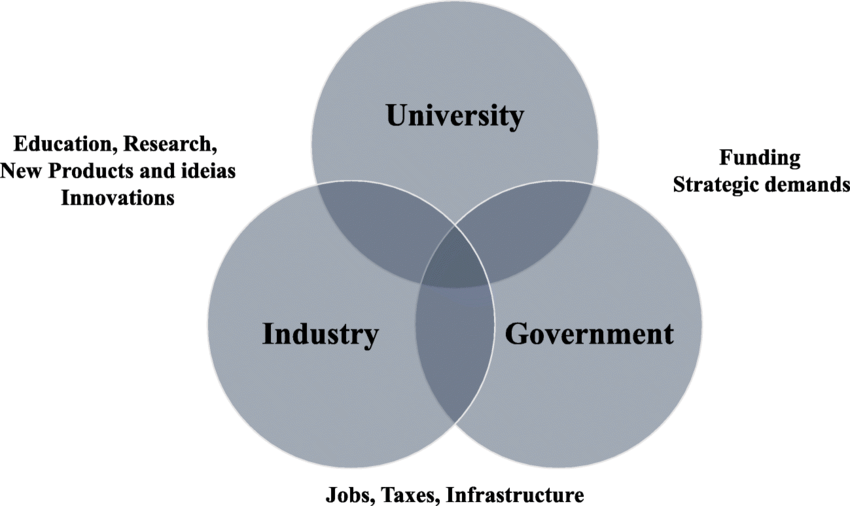The Case for the Triple Helix Model: Driving Success in Business
In a rapidly evolving global economy, the intersection between academia, industry, and government has become a cornerstone for sustainable business success. This synergy, abridged in the Triple Helix Model, emphasizes collaboration across these three pillars to drive innovation, economic growth, and societal progress. By fostering interconnectedness, the Triple Helix Model provides a robust framework for addressing complex challenges and creating opportunities that benefit all stakeholders.
Understanding the Triple Helix Model
The Triple Helix Model is based on the interdependent relationship between academia, industry, and government:
Academia provides research, knowledge, and human capital development.
Industry translates knowledge into innovative products, services, and solutions.
Government establishes policies and provides resources to create an enabling environment.
When these entities work in harmony, the result is a dynamic system that nurtures innovation, and entrepreneurship and supports economic resilience.
Why Businesses Need the Triple Helix
In the competitive market, businesses increasingly need access to cutting-edge research, policy support, and skilled talent. The Triple Helix framework allows businesses to:
Leverage Academic Expertise: Collaborating with universities and research institutions gives businesses access to advanced knowledge, R&D facilities, and a pool of highly skilled graduates.
Influence Policy Development: Engaging with government entities helps businesses advocate for policies that promote innovation, such as tax incentives, grants, and regulatory support.
Drive Innovation Ecosystems: Partnerships within the Triple Helix foster the creation of innovation hubs, startup incubators, and collaborative research centres, creating fertile ground for new ideas and technologies.
Examples of Triple Helix in Action
Kenya’s Agritech Ecosystem:
Kenya’s agritech growth showcases the Triple Helix Model in addressing food security challenges. Jomo Kenyatta University of Agriculture and Technology collaborate with agritech companies such as Twiga Foods to innovate solutions for supply chain inefficiencies. The government’s Big Four Agenda, which prioritizes food security, provides support through grants, policies, and partnerships that facilitate access to markets and funding for agritech startups.South Africa’s Renewable Energy Innovations:
South Africa’s renewable energy sector reflects the power of the Triple Helix Model. Stellenbosch and Wits Universities engage in cutting-edge research on solar and wind energy. Private companies such as BioTherm Energy and Eskom collaborate with academia to develop and implement renewable energy solutions. Government initiatives, including the Renewable Energy Independent Power Producer Procurement Programme (REIPPPP), create a supportive policy and funding environment for innovation and commercialization.Egypt’s Smart City Development:
The development of Egypt’s new administrative capital illustrates a Triple Helix approach. American University in Cairo contributes research and expertise in urban planning. Industry players, including Siemens and Orascom, partner with the government to build and implement smart city technologies. The Egyptian government provides the vision and regulatory support, ensuring the project aligns with national development goals.Ghana’s Cocoa Industry Sustainability Efforts:
In Ghana, Kwame Nkrumah University of Science and Technology collaborate with cocoa producers to research sustainable farming techniques. Industry stakeholders such as Olam Ghana invest in farmer training and supply chain improvements. The government supports these initiatives through policies aimed at enhancing agricultural productivity and providing funding for sustainability-focused programs.
Recommendations for Businesses Embracing the Triple Helix
For businesses looking to engage in the Triple Helix Model, the following strategies are essential:
Actively Participate in Research Collaborations: Partner with universities to co-create research projects that align with your industry needs. This provides access to innovative solutions while fostering knowledge exchange.
Invest in Talent Development: Support academic programs through scholarships, internships, and mentorships to ensure a steady pipeline of skilled graduates tailored to your business needs.
Engage in Policy Advocacy: Collaborate with government agencies to influence policies that drive innovation, including funding for R&D and the establishment of enabling regulations.
Establish Innovation Hubs: Co-develop innovation hubs and incubators with academic and government partners to nurture startups and test new ideas.
Leverage Technology for Collaboration: Use platforms that enable virtual collaboration between academia, industry, and government, ensuring seamless communication and project management.
The Way Forward
For businesses to thrive in the 21st century, embracing the Triple Helix Model is no longer optional—it is essential. By fostering collaboration, sharing resources, and aligning goals, the Triple Helix Model can unlock unprecedented growth opportunities for businesses while addressing critical societal challenges.
N3 Consulting Limited’s Role in Promoting the Triple Helix
At N3 Consulting Limited, we are committed to advancing the adoption of the Triple Helix Model across Nigeria and Africa. Here’s how we plan to make an impact:
Facilitating Collaborative Platforms: Organize industry-academia-government roundtables, workshops, and forums to foster dialogue and build lasting partnerships.
Capacity Building for Academia: Provide training for lecturers and researchers on how to align academic research with industry needs, including commercializing intellectual property.
Policy Advisory Services: Partner with government agencies to design and implement policies that promote innovation ecosystems, R&D funding, and startup incubation.
Promoting Sector-Specific Hubs: Advocate for and support the establishment of innovation hubs focused on priority sectors like fintech, agritech, edtech, and renewable energy.
Supporting Talent Pipelines: Work with businesses to design internship programs and co-curricular projects that allow students to gain hands-on experience in their fields.
Driving Awareness and Advocacy: Publish case studies and articles showcasing successful Triple Helix collaborations to inspire replication and scaling across sectors.
Through strategic initiatives and thought leadership, N3 Consulting Limited is dedicated to transforming the African business landscape by championing this innovative model. The future of business success lies in our collective ability to bridge the gaps between academia, industry, and government, creating ecosystems that foster growth, innovation, and societal progress.




